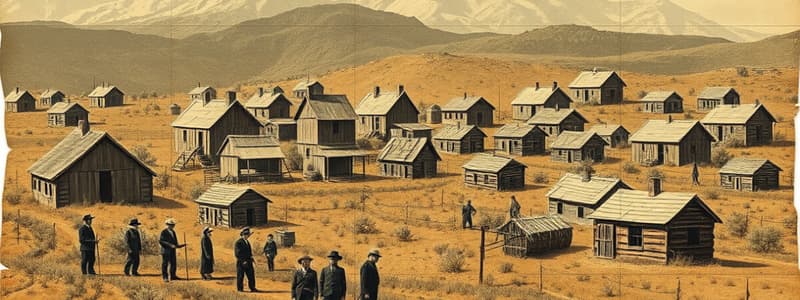Podcast
Questions and Answers
Match the following acts or events with their descriptions:
Match the following acts or events with their descriptions:
Dawes Act = Divided reservation into individual plots for farming Chinese Exclusion Act = First federal law restricting Asian immigration Homestead Act = Gave 160 acres of land to citizens for a small fee Immigration = Moving from one's homeland to live in another place
Match the following terms with their meanings:
Match the following terms with their meanings:
Cattle Drive = Movement by cowboys of cattle to rail stations Urbanization = Process of migrating to densely populated areas Tenements = Single room apartments often lacking basic amenities Ghettos = Neighborhoods of people with similar cultural backgrounds
Match the following historical events with their significance:
Match the following historical events with their significance:
Klondike Gold Rush = Attracted miners due to discovery of precious metals Indian Wars = Clash over land and culture in the West Corruption = Dishonest conduct, often involving bribery Boss Tweed = Notorious political machine in New York City
Match the following concepts with their definitions:
Match the following concepts with their definitions:
Match the following concepts to their descriptions:
Match the following concepts to their descriptions:
Match the following terms with their historical context:
Match the following terms with their historical context:
Match the following terms with their impacts:
Match the following terms with their impacts:
Match the following policies/acts with their goals:
Match the following policies/acts with their goals:
Flashcards are hidden until you start studying
Study Notes
Frontier
- Area in the U.S. settled by farmers transported from the East via the Transcontinental Railroad.
Dawes Act
- Established a line separating settled areas from lands predominantly inhabited by Native Americans and untouched nature.
Klondike Gold Rush
- Began in 1896 when the discovery of precious metals drew miners to the Klondike region in Canada.
American Indian Citizens Act
- Legally granted U.S. citizenship to all Native Americans.
Tenements
- Small, crowded apartments often lacking basic amenities such as heating, lighting, and sewage systems.
Immigration
- The act of relocating from one’s homeland to a new country for settlement.
Cattle Drive
- The practice of cowboys moving cattle to northern rail stations, facilitating transport to markets in the Eastern U.S.
Ghettos
- Communities comprised of individuals sharing similar nationality, language, and cultural characteristics.
Chinese Exclusion Act
- The first federal legislation aimed at restricting Asian immigration to the United States.
Indian Wars
- Conflicts exemplified by the Battle of Little Bighorn, involving clashes between settlers/soldiers and Native Americans over land rights and cultural differences.
Great Plains
- Land where the Dawes Act divided reservations into individual plots, allotting 160 acres to each family for farming to encourage ownership pride.
Urbanization
- The trend of migration towards large, densely populated urban areas, primarily cities.
Homestead Act
- An 1862 law that provided 160 acres of land to eligible citizens who met specific criteria and paid a nominal fee.
Boss Tweed
- Infamous leader of a political machine that aimed to secure Democratic control in New York City.
Assimilation
- The process by which individuals adopt the cultural norms of a dominant group.
Nativism
- Policy that promotes the interests of native populations over those of immigrants.
Corruption
- Engaging in dishonest practices, including bribery, by those in positions of power.
Industrialization
- The development of industries through the establishment and operation of factories and businesses.
Robber Baron
- A term describing wealthy industrialists in the late 19th century who profited through exploitative practices.
Labor Union
- An organization formed by workers to advocate for better working conditions, wages, and benefits.
Monopoly
- A market structure characterized by a single seller dominating and controlling the market with many buyers.
Philanthropy
- The act of providing charity or promoting goodwill through various efforts.
Segregation
- The enforced separation of individuals based on racial, ethnic, or other distinct differences.
Settlement
- A small community established by people who relocate to a new area.
Civil Service
- A merit-based system for hiring and promoting individuals within government positions to ensure nonpartisan governance.
Studying That Suits You
Use AI to generate personalized quizzes and flashcards to suit your learning preferences.




